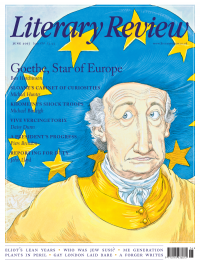Nick Holdstock
Leaps of Faith
The Souls of China: The Return of Religion after Mao
By Ian Johnson
Allen Lane 455pp £25
In 1999 the Chinese government launched a campaign against practitioners of Falun Gong, a system of t’ai chi and meditation influenced by Buddhism and Daoism. There were tens of thousands of arrests; the media denounced Falun Gong as an ‘evil cult’ based on ‘superstition’. The students in the college where I was teaching at the time had to sign a proclamation in support of the ban or face expulsion. I didn’t find this particularly surprising: the opposition of religion and communism seemed axiomatic. I didn’t expect the Communist Party to be supportive of any kind of religion, albeit an apparently benign one mainly practised by elderly people in parks. But even in my small town there were signs that this was too simplistic a view. On a nearby hill there was a red temple devoted to Guanyin, the Buddhist Goddess of Mercy. In the town centre a six-foot cross was perched on top of a building that contained a church.
Ian Johnson’s book is a much-needed corrective to the persistent notion that China’s rulers are implacably opposed to all forms of religion. The Souls of China explores the extraordinary religious revival that has taken place throughout the country since the death of Mao. While there’s some debate over the exact

Sign Up to our newsletter
Receive free articles, highlights from the archive, news, details of prizes, and much more.@Lit_Review
Follow Literary Review on Twitter
Twitter Feed
Though Jean-Michel Basquiat was a sensation in his lifetime, it was thirty years after his death that one of his pieces fetched a record price of $110.5 million.
Stephen Smith explores the artist's starry afterlife.
Stephen Smith - Paint Fast, Die Young
Stephen Smith: Paint Fast, Die Young - Jean-Michel Basquiat: The Making of an Icon by Doug Woodham
literaryreview.co.uk
15th-century news transmission was a slow business, reliant on horses and ships. As the centuries passed, though, mass newspapers and faster transport sped things up.
John Adamson examines how this evolution changed Europe.
John Adamson - Hold the Front Page
John Adamson: Hold the Front Page - The Great Exchange: Making the News in Early Modern Europe by Joad Raymond Wren
literaryreview.co.uk
"Every page of "Killing the Dead" bursts with fresh insights and deliciously gory details. And, like all the best vampires, it’ll come back to haunt you long after you think you’re done."
✍️My review of John Blair's new book for @Lit_Review
Alexander Lee - Dead Men Walking
Alexander Lee: Dead Men Walking - Killing the Dead: Vampire Epidemics from Mesopotamia to the New World by John Blair
literaryreview.co.uk